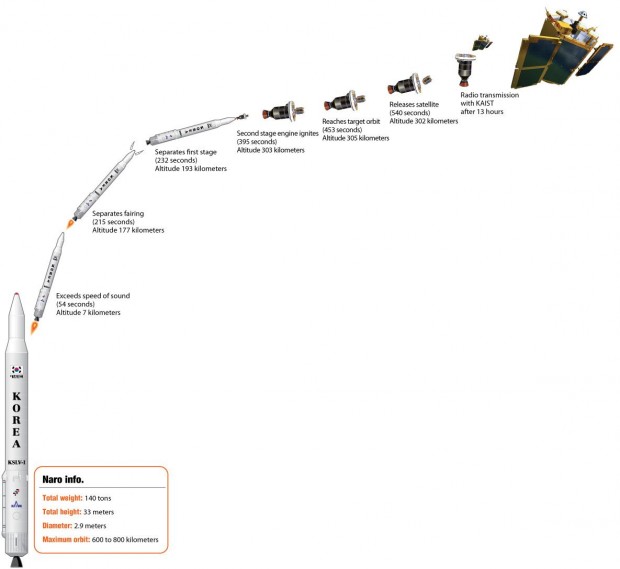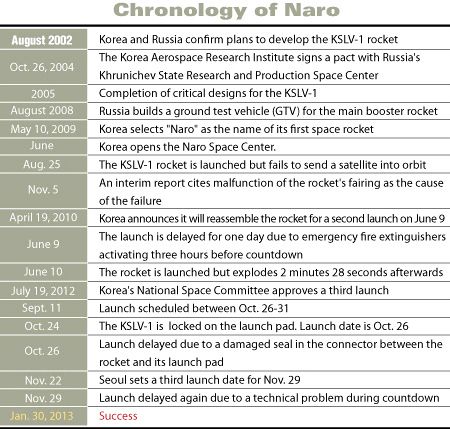The exhilarating 30 minutes
Korea takes first confident step in space exploration
GOHEUNG, South Jeolla Province ㅡ At long last, Korea’s ten years of work to launch a locally assembled rocket into space paid off Wednesday. The nation took the first legitimate step in the global space race.
The emotional toll on everyone ㅡ government officials, reporters, and the people ㅡ were well shown in the 30 minutes before and after launch.
The media room near Naro Space Center was filled with uproar as women’s voice from a speaker emotionally announced that the locally-assembled two-stage Korea Space Launch Vehicle-1 had been successfully launched and released its satellite payload into the desired orbit at 4 p.m., around 10 minutes after takeoff.
A general atmosphere of mirth enwrapped reporters and government officials, and laughter ensued everywhere.
At the start of the 15 minute countdown before the launch, the mood was the polar opposite: reporters seemed more concerned of what they were going to have for dinner than the fate of the rocket.
Most of them have watched the third attempt delayed twice, and a few were actually here when Korea started building the Naro Space Center in 2004. They were tired, and expected nothing. “I bet it will stop around minus seven minutes this time,” said one reporter languidly.
But second by second, the clock continued ticking. Minutes passed. At minus five minutes, reporters in “disbelief” started concentrating and fell silent.
Up in the main command center above the media room, Lee Ju-ho, minister of education, science and technology, and high-level officials and executives of the government also fell silent.
Small chats ended at minus twelve minutes, and Lee and others craned their necks upwards toward the countdown clock, with only their breathing audible. Cho Gwang-rae, head of the Naro project at the Korea Aerospace Research Institute (KARI), took off his glasses, but seemed too enraptured by the clock to realize he hadn’t put them back on.
It was now minus two minutes. The launch was happening: one KARI official later said “It was the longest two minutes of my life,” a redundant phrase, but spoken in all earnestness.
Three seconds left: no turning back now, as the 170-ton thrust engine in the lower stage boomed.
Lift off.
Reporters stood on edge in their chairs during the final five, four, three, and jumped up before it concluded as Naro began a journey brief but of insurmountably importance to those involved.
The women on the speaker, in a clam voice as if she was muttering catechisms, minute by minute confirmed and updated the status of the rocket.
“Naro has reached an altitude of 177 kilometers”: silence.
“The first stage has been successfully separated and the second stage is heading toward the desired orbit at 232 seconds:” murmurs of joy.
“The second stage has successfully activated its engine and is heading towards the desired orbit”: shouts here and there.
And at ten minutes, the speaker said what everyone wanted to hear.
KARI officials, who had become understandably media shy after previous failures, came of the nooks and crannies to take part in the carnival.
Hours before the launch around noon, a father and his two sons strolled around the seaside around the Naro Space Center, probably a postprandial walk to help digestion. They were here to see the rocket launch first-hand.
The younger son was keen to ask questions about the rocket to his older sibling.
“So the first-stage falls off and drop to the ocean?” he asked. “Yes,” the older one said, though obviously a teenager judging by his pimples.
“And the rest of it goes into outer space,” he asked, unabashed. “Yes, then when it reaches orbit, the satellite comes out of it and starts to circle the earth,” said the older one.
“I want to go to space, too,” he said. The older one, no longer condescending, said: “Yeah, me too.”
Minister Lee, after the takeoff in a conference, said that he hoped “the launch inspired children and teenagers to not give-up on their hopes for science and technology.” It seems it is already inspiring. <The Korea Times/Cho Mu-hyun>






